Last updated on September 29, 2023
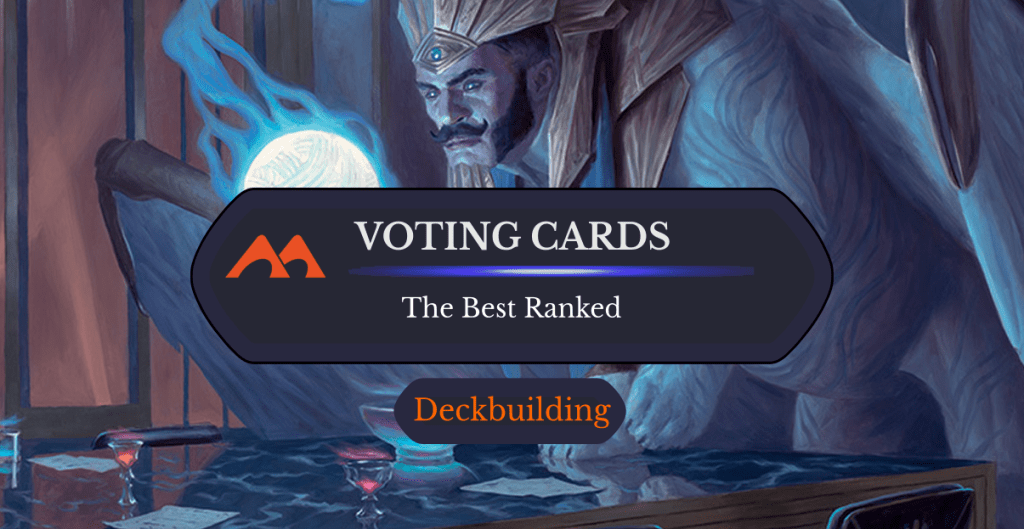
Tivit, Seller of Secrets | Illustration by Chris Rahn
Ah, kitchen table politics. No, not the family discussions or current events. We aren’t worrying about that here. I’m talking about casting Expropriate and making your entire Commander playgroup groan with frustration at having to pick their poison.
Cards that let the table vote for different effects on resolution are extremely interesting. There aren’t too many of them around, but all of them put your opponents in sticky situations that are sure to swing things in your favor.
So, let’s get right to it and go over it all!
What are Voting Cards in MTG?
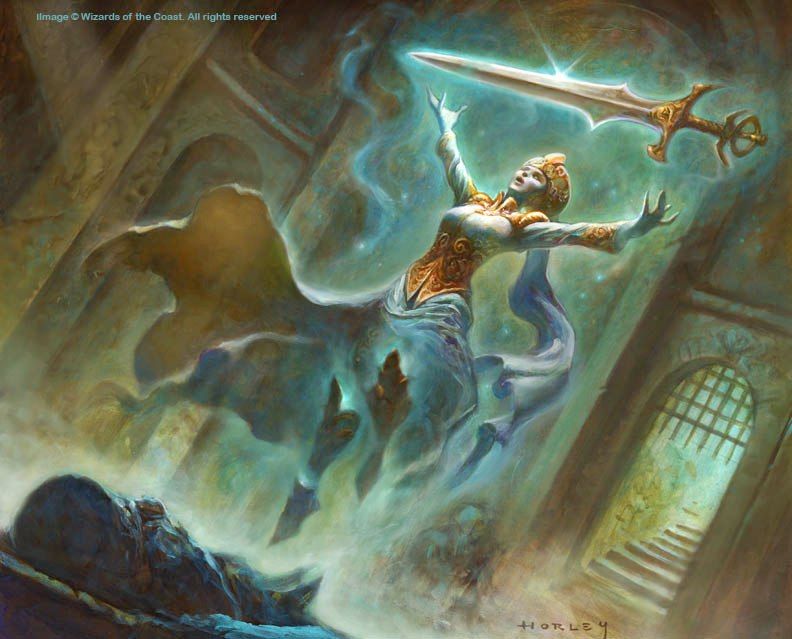
Custodi Squire | Illustration by Alex Horley-Orlandelli
Voting cards are cards that force the entire table to vote on a predetermined list of choices when cast. This list is often just a “one or the other” type deal. After the entire table votes, the effect with the most votes (or those tied with the most votes) resolves. The votes are cast in turn order starting with the player who casts the spell, and the votes are tallied once all players have voted. No player can abstain from voting.
For the rankings today I’m going to look at the most powerful effects among the voting cards. It’s important to note that there are cards that interact with voting, but they don’t do anything on their own without the actual cards that start the votes, so I’m barring those from the ranks.
I’ll examine them further down the line. Now, from worst to best, let’s start!
#17. Magister of Worth
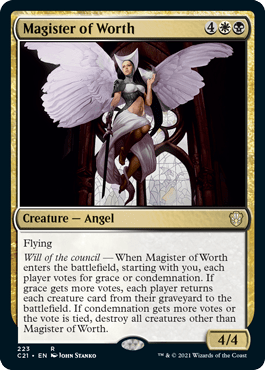
Magister of Worth costs a whopping . That might not be a whole lot of mana for your Commander group. Maybe you consistently churn out a ton of mana to spend on huge spells as games run long into the night, but you’d rather it be a little more guaranteed than it is when it comes to Magister’s effect.
The only reason this sits at #16 is because of its potential negative effect. You won’t want to cast this if everybody can vote for grace and they have fantastic creatures in their graveyard that outrank yours. If you have a huge strong board state and your opponents don’t, they might vote condemnation.
In that case you wouldn’t want to cast this. It’s the worst of the bunch since you could get caught with it and not want to do anything with it. It just isn’t worth it.
#16. Council Guardian
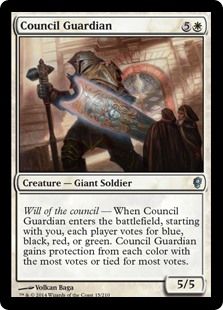
Council Guardian is a 5/5 for , so not a bad body. But it’ll gain protection from chosen colors according to the votes cast when it enters the battlefield.
This can do really well if your opponents all spread the votes out and tie it between four colors, but otherwise they’re more likely to agree on one color. This would just result in an okay creature that has a decent ability that might not make it to the next turn. Unfortunate.
#15. Orchard Elemental
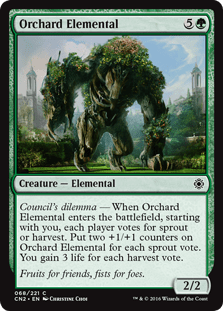
A bit better than Council Guardian, Orchard Elemental forces players to vote for sprout or harvest. It gets two +1/+1 counters for each sprout vote while you gain three life for each harvest vote. This seems nice.
That is, until you draw the Elemental late in the game with a weak board state and you pay for a 2/2 or a 4/4 and gain 9 to 12 life that ends up getting smacked down to the ground once you pass your turn. It’s a good card to tempo into when you’re snowballing and applying pressure, but not something that can save you from a truly sticky situation.
#14. Lieutenants of the Guard
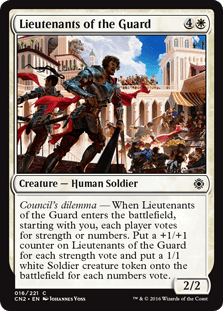
Now we’re getting into some more interesting cards. Lieutenants of the Guard is a 2/2 for that lets players vote to make it bigger or give you 1/1 Soldier tokens.
This is more likely to get you a little farther than Orchard Elemental if you draw it later in the game since it can add to your board state or be a big creature. The board presence is ideal, but it can end up as a 6/6 if everybody votes for strength, which isn’t bad either.
#13. Messenger Jays
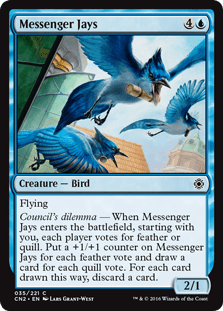
Not only do you vote with this card, but it has flying! Messenger Jays either grows through +1/+1 counters or loots cards depending on what your table votes. Coming in at , it’s a 2/1 flier that has the potential to be up to a 6/5 flier or loot up to four cards.
Sure, you aren’t drawing pure card advantage, but you’re still filtering bad cards out of your hand to make sure you have straight gas for the next few turns. You’re getting a decently evasive body on the board if you aren’t loading your hand with strong cards.
#12. Tyrant's Choice
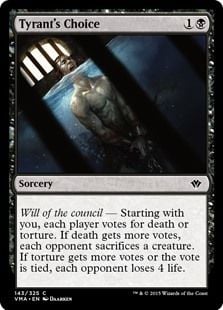
Tyrant's Choice is the fastest of the voting cards since it only costs to cast. This would be higher on the list if it were more impactful, but it really doesn’t do much if it isn’t an opening card you see.
Your opponents get to decide if they want to sacrifice a creature or lose four life with this, and it’s likely that they’ll lose the life every time. This would be great if life wasn’t such a malleable resource, especially in the early game. It just won’t land how you want it to often enough to make it worth it.
But you’re still doing a collective amount of damage to your foes or forcing them to give up a little bit of their board state. This card is hardly a dud, you just can’t expect it to get players to sacrifice anything very often.
#11. Bite of the Black Rose
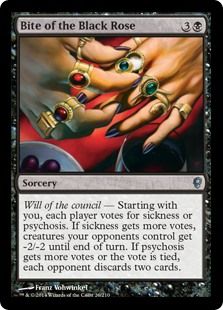
Bite of the Black Rose is a really nice spell for . Players vote between sickness or psychosis (the card’s words, not mine). Psychosis results in each opponent discarding two cards while sickness gives all creatures your opponents control -2/-2 till the end of the turn.
Bite’s impact is very dependent on when it gets cast. Players are likely to let the -2/-2 effect resolve before they discard those aces they’re holding in their hands when they have large boards with big creatures. But they’re liable to discard a couple duds rather than let their mana dorks and other small creatures die out if you can curve into this on turn 3 or 4.
This card’s ability to act according to tempo at any point in the game with some fairly average effects gives it the #10 spot.
#10. Plea for Power
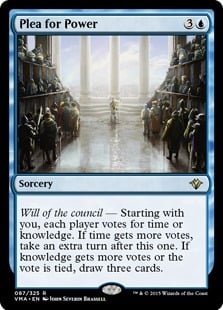
You see Plea for Power and you might be thinking that it’s weird for an extra turn spell to be sitting in such a neutral spot. Except it’s not really an extra turn unless your opponents are scared of the top of your deck.
This most likely ends up with you paying to draw three cards. The best psychological chance I think you can manage if you really want that extra turn is to play Doomsday to make sure your opponents know they definitely wouldn’t like the reality where you get those three cards a few turns early.
Alternatively you might be able to swindle a turn out of the other players with a few promises or deals if you have confidence in your ability to negotiate. Like, you’ll take care of X threat that’s been getting in player A’s way for a while with this extra turn.
Solid ratio of mana to potential return. Nothing bad comes from either vote.
#9. Custodi Squire
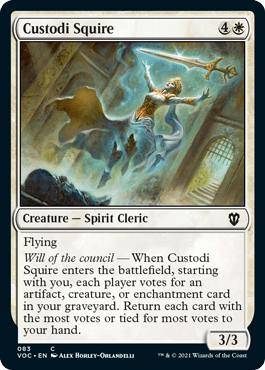
Custodi Squire creates a fun opportunity to react with your playgroup. It forces everyone to vote for an artifact, creature, or enchantment card in your graveyard. The most voted card gets returned to your hand, or multiple if the votes are tied.
Some solid negotiations can lead to huge returns for you, but otherwise it’s the ability to return a card from the graveyard to your hand in white, something that green does more often than most colors. It also has a body attached to it that can help defend you on board. There’s nothing wrong with that, even if it’s a little pricey at .
Its tough comparing Squire to Plea for Power, but recursion in a deck is something I believe to be more dangerous than anything else in the right scenario. Being able to draw or take more turns does nothing if the key to winning is lost in the grave to a past turn. This card acts as a powerful bargaining chip that can save everyone’s hides when the time is right.
#8. Capital Punishment
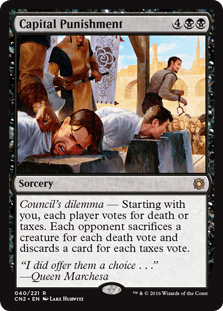
Capital Punishment is a bit of a rude card. That’s why I love it.
You’re making sure that each of your opponents discards a card or sacrifices a creature for . Either of these effects can happen up to three more times depending on how the table votes. You’re robbing your table of tons of value and really getting a step ahead of the game no matter how the vote ends.
#7. Galadriel, Elven-Queen
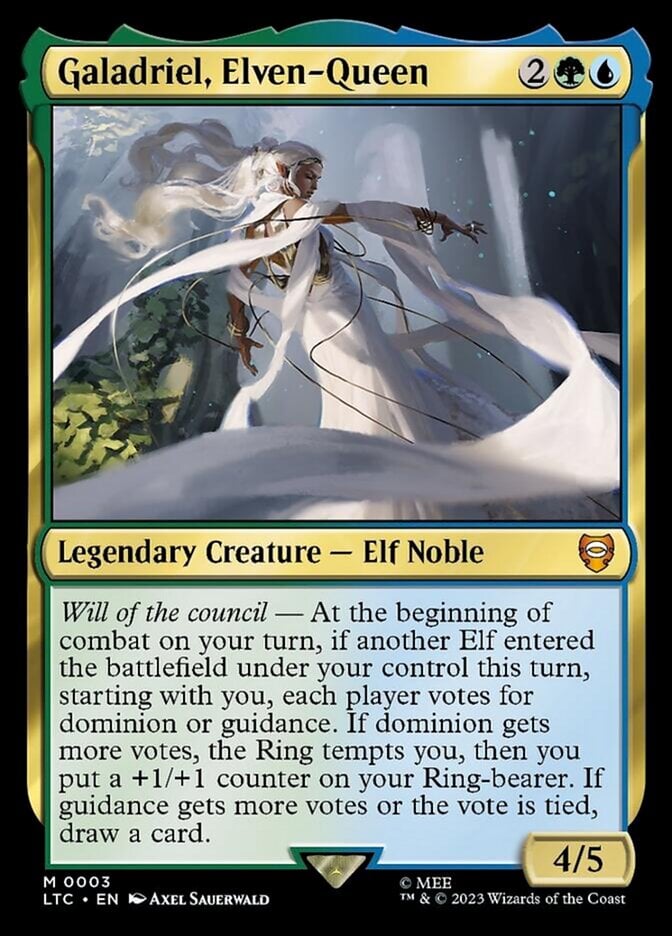
Galadriel, Elven-Queen is one of many voting cards from LotR: Tales of Middle-earth and is a 4/5 Elf Noble for . The council vote fires off at your combat step if you've had another elf enter the battlefield under your control that turn.
The vote comes down to two different outcomes. You'll either be tempted by the ring and get a +1/+1 counter onto your ring-bearer. Otherwise, you'll draw a card. A very simple vote with both outcomes being extremely positive.
#6. Council's Judgment
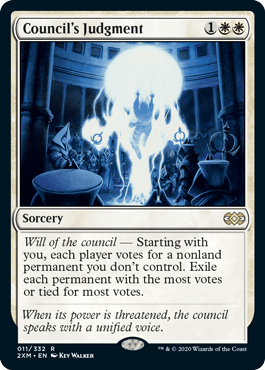
It’s better removal than Capital Punishment. Sure, Council's Judgment can take out less than other cards on this list, but it’s permanent removal in the form of exiling what’s chosen. Up to four permanents can be chosen if everybody cooperates and negotiates properly, but you’re likely going to end up exiling two or three most of the time.
That said, Judgment circumvents hexproof and similar effects since it doesn’t target anything. It just says to get rid of what you choose. Have fun with that.
#5. Selvala's Stampede
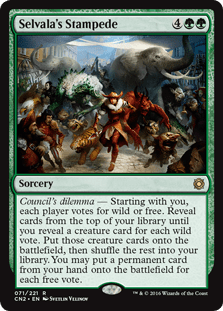
Okay, now we’re getting into nuttier material. Selvala's Stampede basically tells players to choose whether you get random creatures from the top of your library or permanents from your hand, and they’re also in charge of deciding how many of each you get.
You get four permanents on the field for . Even if everybody makes you use the top of your library for free stuff, you still get a vote. And you can do some crazy stuff with that vote, like drop Blightsteel Colossus on them or run out any of the Eldrazi titans for a ridiculously cheap price.
#4. Tivit, Seller of Secrets
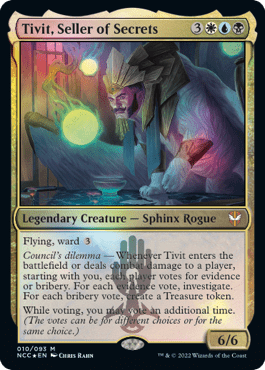
Okay, this one’s cool. I mean, it’s probably gonna be your commander after you see it, right?
Tivit, Seller of Secrets easily earns the #4 spot on the list for its sticky nature and absurd potential value over time. It starts up a vote whenever it enters the battlefield or attacks, which generate Treasure and Clue tokens depending on how the voting goes.
You also get to vote an extra time, which goes for all vote cards. Kinda wacky, right? So you’re guaranteeing two Treasure tokens when it enters the battlefield, which is ramp in colors that don’t often ramp. It can also fly on top of all that, giving it great evasion for its 6/6 stats.
And, one final note, Tivit has ward 3. Kill spells are going to get super expensive against it, which means you’re presenting a very powerful piece of cardboard to your table the moment it hits the field.
#3. Expropriate
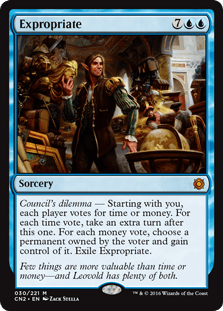
This is one of my favorite cards. Expropriate is simple. How many turns are your opponents willing to let you have? And if they don’t want you to have one, are they really going to be okay with you taking whatever you want in exchange for not being allowed to have an extra turn or three? The only reason this doesn’t take either of the top two spots is because it costs . It’s not exactly easy to get to unless you’re built for big mana.
Go ahead and run this in a Yuriko, the Tiger’s Shadow Commander deck if you want to get really funky. It’ll flip for big damage and you’ll get to do big things later down the line.
#2. Coercive Portal
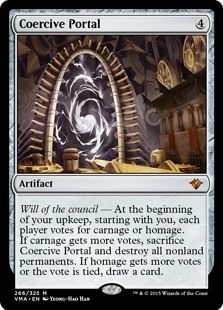
Coercive Portal is probably the coolest card that players can use when setting up a political atmosphere in their games. It becomes leverage for literally everyone if it’s played early enough.
You always draw an extra card each turn you control it, but it’ll nuke everything on the field if your opponents decide that it’s time. And that’s fine, because you’ve likely played around the self-destruct and can grant some (or all) of your permanents indestructible if you play this, or just sandbag a little bit and hold back the good stuff until the board is clear.
Portal keeps the whole table on their toes, and players might even start trading their vote for favors. Like, “if you don’t make this play for me, I’ll start voting for carnage to destroy everything,” or, “hey, I’ll take my vote off carnage for a few turns and vote homage if you help me out here.” You can secure a lot of influence in the pace of a game from early on if you’re clever with your words and protect this card. Invaluable.
#1. Split Decision
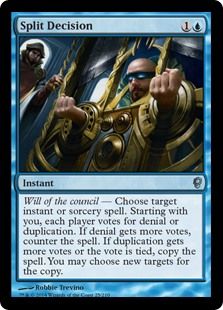
You might think I’m crazy, but hear me out. , instant speed. Split Decision counters a spell if your table wants it countered, but copies it if they want you to get jiggy with it. Super duper barebones and simple.
But don’t look at this like it’s conditional to your table’s discretion. It’s not. They can’t control this thing if you don’t want them to, you just have to have the right target.
Cast this to counter a counterspell. If the table votes for denial, you get to counter the counterspell and your bigger play gets to go through. Or you’ll save your buddy’s spell from getting shut down. If the table votes duplication for whatever reason, you get to counter that spell anyways because you’ll copy the counterspell and aim it at the original. Your copy resolves first and bam, you still accomplished your mission.
Decision is a fun card to bargain with in certain matchups, but it always serves you well against other control lists. This card is going to serve you well more often than not as long as you target the right spells and don’t let yourself get your own spells countered by your opponents’ votes. A counter up your sleeve will never be useless.
Best Voting Payoffs
There are a few ways to take advantage of your voting cards. If you’re curious about what sort of shenanigans you can get up to, let’s look at a few.
Flickering Voting Creatures
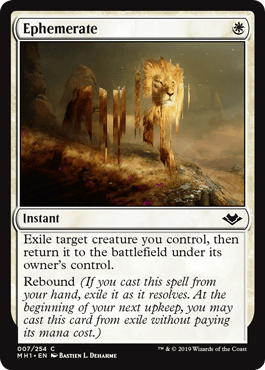
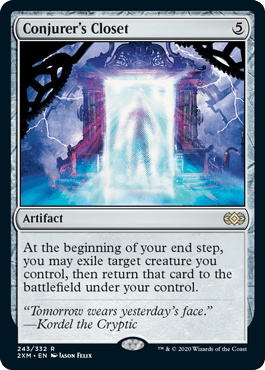
There are a few good spells like Ephemerate and Conjurer's Closet that flicker creatures to get more out of their ETB effects. Hitting creatures like Custodi Squire or Messenger Jays can make sure you’re really pulling the extra mile out of those cards.
Maximize Those Votes
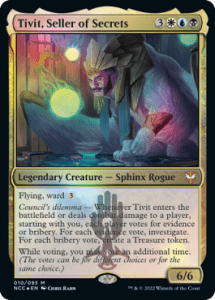
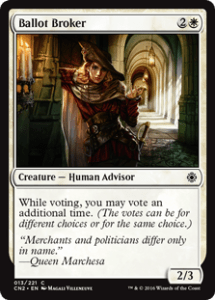
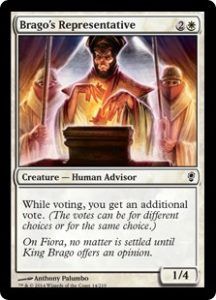
Your opponents can only vote once, but you don’t have to follow that rule. Cards like Tivit, Seller of Secrets, Ballot Broker, and Brago's Representative all allow you to vote an extra time so that you can stack up some really unfair votes against your opponents if they aren’t cooperating with you.
Dissuade Disagreement
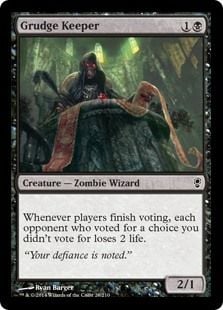
There are a couple cards that you can use to make sure you get your way. Your opponents can’t always vote against you if you have Grudge Keeper on the field since it’ll hit anybody that disagreed with you for two life after voting is done. Sure, they can pay the price a few times, but it’ll add up eventually and hopefully convince them that there’s more than one right answer.
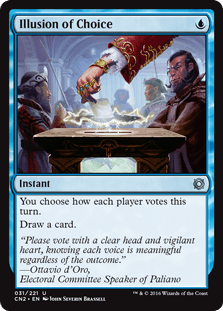
If that doesn’t work, feel free to cast Illusion of Choice and show them what they’re supposed to do by forcing them to vote how you want them to for the rest of the turn.
Will of the Council vs. Council’s Dilemma
Will of the Council and Council’s Dilemma both invoke the same voting method, but they end differently.
Will of the Council cards only have one effect triggered once after voting is over, and that depends on what the majority picked. It’s very mutual in its delivery and doesn’t waver depending on the votes.
Council’s Dilemma is an argument, and the result changes for each vote. The caster gets what they want in some small part when players vote for this, while it’s up to the table to decide what they’d rather let happen to themselves or others.
What if Will of the Council Ties?

There’s always a clause for ties in the vote on cards that use Will of the Council: it defaults to a predetermined option. Take Split Decision for example. It says that “if denial gets more votes or the vote is tied, copy the spell.” Duplication is the default result in the case of a hung jury, and the caster gets to copy the spell in question if Decision splits the vote.
Does Will of the Council Target?

To put it simply, no, Will of the Count doesn’t target. Let’s look at Council's Judgment as an example. You exile each permanent with the most (or tied for the most) votes, but it never explicitly says that you’re targeting these permanents.
The Council Will Decide Your Fate

Magister of Worth | Illustration by John Stanko
Well, we made it to the end! Voting is a really fun mechanic in Magic that gets the most player interaction that you’ll likely ever see with all of the debate and deal-making that can happen around it. I’m partial to Expropriate.
What’s your final verdict on it all? Are you impressed? Do you have any favorites? Planning to build up a new deck around Tivit, Seller of Secrets after seeing how cool it is? I know I am. Are there any more questions you might have that weren’t answered here? Feel free to drop down to the comments below and start some discourse on the subject, or start a discussion over in the Draftsim Discord.
It’s been good having you all here today. Stay safe, and I’ll see you back here next time!
Follow Draftsim for awesome articles and set updates: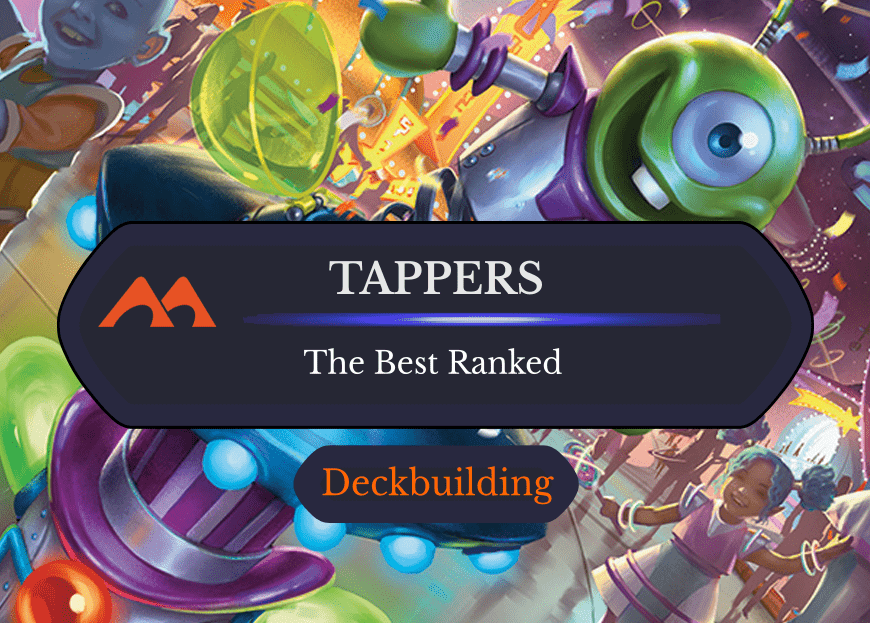
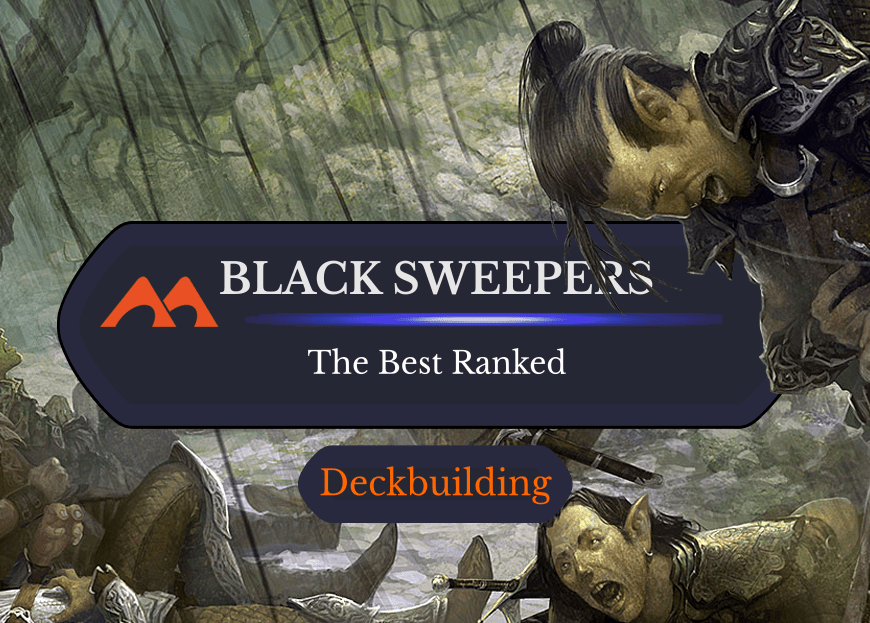
Add Comment